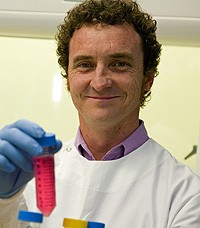Oct 21 2008
A $100 million Australian National Fabrication Facility launched this month in Canberra includes a Queensland node, based at The University of Queensland.
 Professor Cooper-White
Professor Cooper-White
The ANFF links seven university-based centres around the country, giving researchers and industry access to state-of-the-art fabrication facilities.
It was established last year under the National Collaborative Research Infrastructure Strategy, and will enable researchers to engineer and manipulate materials down to the scale of billionths of a metre.
The Minister for Innovation, Industry, Science and Research, Senator Kim Carr said the new facility represented a major step forward in Australia's capacity for research in nanotechnology and micro-fabrication.
UQ Deputy Vice-Chancellor (Research) Professor David Siddle welcomed the announcement.
“The development of facilities to support research is essential to Australia's future international competitiveness,” he said.
“As a leading research-intensive university, UQ is playing a significant role in the development of national research infrastructure.”
Professor Siddle said it was in the national interest for leading research institutions to collaborate on the development of world-class facilities.
The Queensland node has received $12 million support, including $10 million Federal and State Government funding, with the balance from UQ.
Professor Justin Cooper-White, of UQ's Australian Institute for Bioengineering and Nanotechnology, is Director of the Queensland node.
“The facility is more than a collection of leading-edge equipment and specialist clean rooms minimising unwanted particulate contamination; it is managed and staffed by key senior research officers with extensive expertise,” he said.
“It provides a dedicated facility for the synthesis, processing, characterisation and fabrication of functional organics and organic semiconductors, new generation photoresists, functional polymers and nanoparticles and bio-inspired nanomaterials, smart surfaces and microdevices.”
The Queensland node consists of two facilities, the Soft Materials Processing Facility and the BioNano Device Fabrication Facility.
They are based at UQ in purpose-built laboratories in the Australian Institute for Bioengineering and Nanotechnology and the School of Chemistry's Centre for Organic Photonics and Electronics